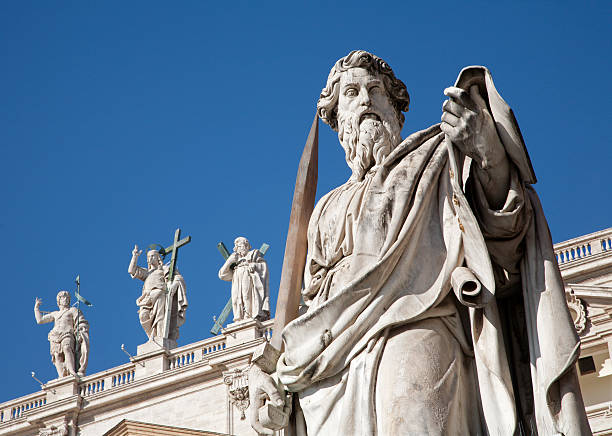By: Daniel Merritt, PhD, ThD | February 8, 2022
Editorial Note: We give our readers the opportunity to ask our staff questions concerning theology, apologetics, philosophy, and the Bible. Some of the questions we receive are answered on the podcast, whereas others are addressed in articles. If you have a question that you would like to ask the Bellator Christi Team, go to https://bellatorchristi.com/submit-a-question-to-bellator-christi/ and fill out the form. Your question could be featured in a future article or featured in an episode of the Bellator Christi Podcast.
Question: “Did Paul and/or James make a mistake in trying to appease the Jewish believers in Acts 21:23–26?” –AnonymousGuy2022.
Answer: If one was asked to name a New Testament Christian who is revered and respected for their faith, who is held in high esteem for their sacrifices in the spread of the Gospel and serves as an inspiration and example of faithful perseverance in the face of persecution, the Apostle Paul would be the name that would likely roll-off the lips of most people. Paul is considered one of the heroes of the faith. While the New Testament record is clear regarding the hardships and sacrifices Paul made during his missionary journeys, the esteemed Apostle was, like every Christian, a sinner saved by grace. Like all of us, Paul had weaknesses of the flesh.
We see an impatient Paul when dealing with John Mark. On Paul’s first missionary journey John Mark is accompanying Paul and Barnabas. The hardships encountered were more than he could bear, so John Mark heads back home (Acts 15:38). Later, when Paul and Barnabas were about to begin their second missionary journey, Barnabas insists on taking John Mark again (Acts 15:37). Paul vehemently disagrees. The contention between Barnabas and Paul was of such a divisive nature that Paul and Barnabas parted ways, with Paul teaming up with Silas and Barnabas teaming up with John Mark (Acts 15:39-40). Years later Paul realizes he may have been a little hasty in his estimation of John Mark, and in his letter to Philemon calls him “a fellow worker” (v. 24). With a conciliatory tone Paul urges Timothy when he visits him to bring John Mark with him, “for he is profitable to me for the ministry” (2 Tim. 4:11). Like us all, Paul at times battled passionate emotions and made decisions not all would agreeably celebrate.
One such decision Paul was faced with in Acts 21 has left many readers of the Acts of the Apostles scratching their heads as to whether or not the esteemed Apostle made the right decision. The question that is often raised in Acts 21 is did Paul make a mistake or did he sin when he submitted to the suggestion of James that he [Paul] join four Jewish men who had taken a Nazarite vow and were still adhering to customs and rituals of the Torah or Mosaic Law?
A little background information will prove beneficial in gaining understanding to what led to Paul joining the four men who had taken a Nazarite vow. Dr. Luke records in Acts 21 Paul’s return to Jerusalem after this third missionary journey. Upon his return, fellow believers received Paul and his companions gladly (Acts 21:17). Luke writes, “And the following day Paul went in with us unto James and all the elders were present; And when [Paul] had greeted them, he declared particularly what things God had accomplished among the Gentiles by his ministry. And when they heard it, they glorified the Lord…” (Acts 21:18-22a).
James and the elders rejoiced with Paul that his mission had been blessed of the Lord with such success; however, they inform him there is a “rumor” that is circulating among the “thousands” of Jew who had become believers in Christ that Paul encourages forsaking the teachings and customs of Moses. Though a multitude of Jews had been saved, they had not come to a full actualization that the shadows represented by the Mosaic Law had been perfectly fulfilled in Christ. A myriad of these Jewish believers still circumcised their children and still observed various customs of the Mosaic Law. Paul is informed that once these Jews learn he is in Jerusalem, they will desire an adequate answer to the circulating rumors. Luke’s record reads, “And they said to him, ‘You see, brother, how many myriads of Jews there are who have believed, and they are all zealous for the law; but they have been informed about you that you teach all the Jews who are among the Gentiles to forsake Moses, saying that they ought not to circumcise their children nor to walk according to the customs. What then? The assembly must certainly meet, for they will hear that you have come.’” (Acts 21:20b-22).
Let it be noted that Paul was not insensitive to the deep convictions of his Jewish kinsmen. The Apostle even had Timothy circumcised to prevent him from being an offense to the Jews (Acts16:3) and that by having him circumcised more doors would open for him. What Paul was opposed to was adhering to any part of the Law in hopes by its observance one can find justification before a holy God or teaching the Gentiles they must become “Jews” before they can be saved. There is no indication from the text that James and the elders agreed with what the “rumor” was contending, yet they felt the issue needed to be addressed.
To squelch any dissension from arising, James and the elders make a suggestion to Paul. Evidently James and the elders had worked out a solution among themselves a means whereby Paul could by example demonstrate that he was not an enemy of the Mosaic Law.[1] Luke informs the reader of their suggested solution to defusing the situation: “Therefore do what we tell you: We have four men who have taken a vow. Take them and be purified with them and pay their expenses so that they may shave their heads, and that all may know that those things of which they were informed concerning you are nothing, but that you yourself also walk orderly and keep the law. But concerning the Gentiles who believe, we have written and decided that they should observe no such thing, except that they should keep themselves from things offered to idols, from blood, from things strangled, and from sexual immorality.” (Acts 21:23-25). They assure Paul that their suggestion was not a reversal of the Jerusalem Conference’s decision as found in Acts 15 regarding the Gentiles, but proactive action needed to be taken to keep peace.
There were four Jewish men who had taken a vow, most assuredly a Nazarite vow. It was suggested to Paul that he identify himself with them, pay their temple fee, and purify himself along with them. If Paul would do this, James and the elders felt it would defuse what could become a volatile situation and show that Paul was “walking orderly and keeping the law” (Acts 21:24). Richard Longenecker writes, “In effect, they were saying to Paul, ‘We can accept this gift from the churches and so identify ourselves openly with your Gentile mission, if you will join with these men and identify yourself openly with the nation.’ Thus, they were protecting themselves against Jewish allegations while at the same time affirming their connection with Paul and his mission.”[2]
Paul agreed to the suggestion. Luke writes, “Then Paul took the men, and the next day, having been purified with them, entered the temple to announce the expiration of the days of purification, at which time an offering should be made for each one of them” (Acts 21:26). It might be noted, since Paul had recently been in Gentile territory, he would have been viewed as ceremonially “unclean,” hence would have needed additional purification in order to partake with the other four.[3]
One taking a Nazarite Vow took a “special vow” that a Jewish person could make to “dedicate himself to the LORD” (Num. 6:2). Josephus mentions the practice of the Nazarite Vow in his writings.[4] One who took such a vow would voluntarily give up wine, grapes, raisins, haircuts, and going near dead bodies (Num. 6:3-6). After he grew out his hair, he was to bring a one-year-old lamb and one ram (Num. 6:14). He would also bring food, grain, and drinks to offer (Num. 6:15). Then the priest would offer his offering before the Lord (Num. 6:16). Afterwards, the man would shave his head and offer hair on the fire (Num. 6:18). He would receive back some of the sacrifice (Num. 6:19). The rest of the sacrifice was to be a “wave offering” before God (Num. 6:20). How much Paul involved himself in all that was involved Luke doesn’t say. Regarding the sacrifice made, it is important to understand that this was not in any way for an offering for the purpose of atonement. Paul clearly understood only the sacrifice of the Christ of the cross can atone for sin. Not every sacrifice in the Jewish system was for atonement; many were for thanksgiving or consecration, as this one was.[5] Also, he would not have been involved in all that was required by those who took the vow because “the minimum period for a Nazarite was thirty days and only seven were involved here” (v. 27).[6]
Here is where the perplexing and sticky question arises: Why would Paul, knowing that the Mosaic system was obsolete, agree to the suggestion of James and involve himself in a purification ritual and an offering being offered for every one of them (v. 26)? Did Paul violate his own teachings by identifying himself with the vow of these four men? Did Paul exhibit hypocrisy when it appears he did that which he scolded Peter for doing in Galatians 2? Did Paul make a mistake or err in appeasing the Jews? Did Paul sin in yielding to the pressured suggestion of James and the elders?
In view of the brevity of Luke’s account, no suggestion offered for Paul’s actions is free from difficulty. While it is impossible to know beyond doubt the motives of Paul, four observations are considered which can help shed light on this difficult issue.
1. Paul’s Actions Were Expedient.
First, Paul’s actions were a matter of expediency. James and the elders saw a volatile situation that needed defusing, and only Paul could defuse it. Paul was excited as he shared the good news of his missionary successes and didn’t want that excitement to subside on a misunderstanding. That being the case, his actions may have been for the purpose of keeping a tense situation from becoming worse. Paul clearly did not adhere to any promotion of the Mosaic Law providing man with justification, and knowing that they were living in a transition period when the various elements (civil and ceremonial) of the Mosaic system were passing away and not wanting to be a stumbling block to Jewish believers who were transitioning away from the Law, and not wanting a tense situation to grow worse, one could see how Paul’s actions could be viewed as an exercise of wisdom in seeking to keep unnecessary disputes from arising. As stated previously, we see an example of expediency in Paul having Timothy circumcised.
Let it be added, if the intent of James and the elders, and Paul’s consent to their suggestion, was to keep peace, peace was not the result. “The Jews which were of Asia, when they saw Paul in the temple stirred up all the people and laid hands on him, crying out, Men of Israel, this is the man that teaches all men everywhere against the people and the law…” (Acts 21:27-28). While James and the elders had hoped for peace, “an interruption came from an unexpected quarter and overturned what seem so wisely planned in the interests of peace.”[7] Thankfully, Paul was delivered from the mob when he was arrested and was carried away by Roman soldiers where he was protected from the mob. If Paul’s actions were a matter of expediency, they failed.
2. Paul’s Actions Were Ethnically Motivated.
Second, Paul’s actions were motived ethnically. Paul by paying the temple expenses involved was exhibiting unity and identifying ethnically with his Jewish brethren who had become believers in Christ. Longenecker clarifies, “To pay the charges for Nazarite offerings was considered an act of piety and a symbol of identification with the Jewish people.”[8] Howard Marshall writes, “This was an accepted act of Jewish piety; Josephus relates that Herod Agrippa I directed many Nazirites to have their heads shaved, the implication being that he paid their expenses.”[9] While the act in of itself was no salvific value to Paul, if he could connect ethnically with his Jewish brethren it would serve as doorway into their hearts with his love for his kinsman and open the door to teaching them a more excellent and accurate way (Acts 18:26). Paul, while his mission was first to the Gentiles, was always seeking ethnic solidarity with his Jews kinsman, seems to have performed a Nazarite Vow earlier. Luke records, “In Cenchrea he had his hair cut, for he was keeping a vow” (Acts 18:18). As Frank Goodwin has observed, “Paul’s conduct in this transaction was perfectly consistent with his previous teaching and practices”[10] With Jewish nationalism intense, James and the elders desired Paul to exhibit solidarity with his brethren.
3. Paul’s Actions Were Evangelistic.
Third, Paul’s actions were evangelistic. Knowing Paul’s burden for the Jews, the reason of his consent was his desire to win other Jewish brethren. Paul was willing to become all things to all men that he might win some. In his own words he stated, “To the weak became I as weak, that I might gain the weak: I am made all things to all men, that I might by all means save some” (I Cor. 9:22). G. Campbell Morgan writes, “This was not the action of a man politic, expedient, and attempting to manipulate circumstances to prevent a breach of the peace, or a riot in Jerusalem. It was not the action of a man trying to save his own life. It was the action of a man who passionately and earnestly desired to do anything if by the doing of it he might deliver the message of his brethren and win them.”[11] From reading Paul’s epistles, which provide an x-ray of his heart, there is no question the underlying motive of Paul’s actions would have been evangelistic.
4. Paul’s Actions Were Erroneous.
Fourth, Paul’s actions were erroneous. Many commentators contend that Paul yielded to the pressure of James and the elders and in so doing violated his own convictions. The entire venture seemed destined for disastrous failure from the start. Morgan writes, “This was a mistake on Paul’s part. He sought by accommodation, contrary to his own conviction, to gain an opportunity of testimony to his brethren, and he lost his opportunity. His brethren were not won. The teaching of this incident is that love must ever be loyal to truth. To sacrifice a principle for a moment in the hope of gaining an opportunity to establish it afterward is always to fail. We never win an opportunity that way.”[12]
While God is Sovereign and even overrules one’s mistakes, the plan of James and the elders was not a success. If Paul was in error in his judgment in this incident, one needs to remember, if Peter could fail (Gal. 2), so could Paul. While Paul acquiescing to their suggestion resulted in him becoming a prisoner of Rome for most of the next five years, God used the incident as Paul wrote of the events that happened to him were for the furtherance of the Gospel (Phil. 1:12).
Conclusion
While the details that Luke supplies the reader (though limited) and from the results of Paul’s actions, one could easily conclude that Paul’s decision to consent to the suggestion of James and the elders was not the wisest decision the Apostle ever made. Adam Clarke has stated, “However we may consider this subject, it is exceedingly difficult to account for the conduct of James and the elders, and of Paul on this occasion. There seems to be something in this transaction which we do not fully understand.”[13] The honest reader must confess there is not enough detail given about the nature of all that was involved in the “vow keeping” ceremony to make a decisive judgment about Paul’s decision. As well, the reader is not informed how much Paul was involved in the ceremony. As previously stated, Paul would not have been involved in all that was required by those who took the vow because “the minimum period for a Nazarite was thirty days and only seven were involved here” (v. 27).[14] Sometimes one can only make decisions on the information that is available at the moment, and that is what Paul did. Whatever was Paul’s motive and involvement, one fact we can be certain of from all that we know about this hero of the faith, that underlying his decision was how the Gospel of Christ could be furthered. While Christian love must ever be loyal to truth, if one’s motive is to see others come to Christ then Paul is an example of how the Lord can even take what appears to be a “mistake” and use it for the furtherance of the Gospel. If one is to err in judging this incident, it is best to err on the side of respect and admiration for one of God’s most noble servants.
About the Author
 Daniel Merritt, a native of Sanford, NC, received his Ph.D. in Ministry from Luder-Wycliffe Seminary and his Th.D. from Northwestern Seminary. He also received his M.Div. from Southeastern Baptist Theological Seminary and studied philosophy and religion at Campbell University. Dr. Merritt has pastored six churches in North Carolina, teaches at the Seminary Extension of the Southern Baptist Convention, and serves as the Director of Missions for the Surry Baptist Association in Mount Airy, North Carolina. Dr. Merritt has written several books, including A Sure Foundation: Eight Truths Affirming the Bible’s Divine Inspiration; Writings on the Ground: Eight Arguments for the Authenticity of John 7:53-8:11; and Bitter Tongues, Buried Treasures. Dr. Daniel Merritt is a regular contributor of Bellator Christi Ministries.
Daniel Merritt, a native of Sanford, NC, received his Ph.D. in Ministry from Luder-Wycliffe Seminary and his Th.D. from Northwestern Seminary. He also received his M.Div. from Southeastern Baptist Theological Seminary and studied philosophy and religion at Campbell University. Dr. Merritt has pastored six churches in North Carolina, teaches at the Seminary Extension of the Southern Baptist Convention, and serves as the Director of Missions for the Surry Baptist Association in Mount Airy, North Carolina. Dr. Merritt has written several books, including A Sure Foundation: Eight Truths Affirming the Bible’s Divine Inspiration; Writings on the Ground: Eight Arguments for the Authenticity of John 7:53-8:11; and Bitter Tongues, Buried Treasures. Dr. Daniel Merritt is a regular contributor of Bellator Christi Ministries.
Notes
[1] John B. Polhill, “Acts,” The New American Commentary Vol. 26, (Nashville, TN: Broadman Press, 1992), 448.
[2] R.N. Longenecker, “The Acts of the Apostles,” Ed. F. E. Gaebelein, The Expositor’s Bible Commentary: John and Acts Vol. 9, (Grand Rapids, MI: Zondervan Publishing House, 1981), 520.
[3] Simon Kistemaker, Exposition of the Acts of the Apostles, (Grand Rapids: Baker, 1990), 760. Also see Polhill, Acts, 449.
[4] Jewish War, 2.15.1, 313; Antiquities, 19.6.1, 293–94.
[5] Polhill, Acts, 449.
[6] Ibid, 450.
[7] Charles Ellicott, Ellicott’s Bible Commentary, (Grand Rapids, Michigan: Zondervan Publishing House,1971), 907.
[8] Longenecker, The Acts of the Apostles, 520.
[9] Howard Marshall, Acts Vol. 5, (Downers Grove, IL: InterVarsity Press, 1980), 364.
[10] Frank Goodwin, A Harmony of the Life of St. Paul, (Grand Rapids: Baker, 1951), 121).
[11] G. Campbell Morgan, Acts of the Apostles, (Old Tappan, NJ: Fleming H. Revell Company, 1924), 486.
[12] Morgan, Acts, 486.
[13] Adam Clarke, Commentary on the Holy Bible Vol. V, (New York: T. Mason and G. Lane, 1825), 860.
[14] Polhill, Acts, 449.
© 2022. BellatorChristi.com.






[…] a means whereby Paul could by example demonstrate that he was not an enemy of the Mosaic Law.[1] Luke informs the reader of their suggested solution to defusing the situation: “Therefore do what […]